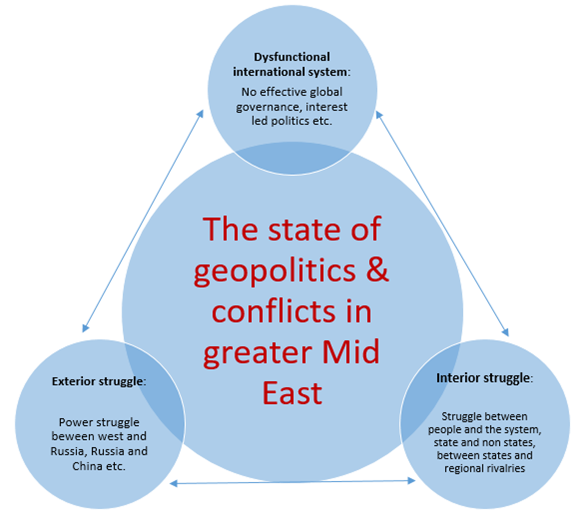Annual Strategic Brief 2016: “Geopolitics in the Middle East”
MIDDLE EAST AND NORTH AFRICA, 4 Jul 2016
Institute for Islamic Strategic Affairs – TRANSCEND Media Service
29 Jun 2016
Executive Summary
(Click Here to Read the Full Paper)
This Ibn Khaldun paper is part of the annual strategic paper series that has been produced each year by our institute since 2013. Each paper looks at the key strategic development(s) in the Islamic world. This year the focus is on the geopolitics in the greater Middle East. The region is going through seismic changes and what happens in the greater Middle East will establish the emerging global order(s).
Yet, there is a very little understanding of what actually is happening in the region. Simple explanations and ‘quick-fix’ approaches has thus far dominated the media. Whether it’s the refugee crises, the focus on degrading the Islamic state (IS) or European security, little attention is being paid to the enormous complexity to the crises in the region.
This paper seeks to understand these complex issues and challenges, and presents a broad, substantial and accurate understanding of the region.
The paper builds on following main arguments (see the figure below):
- The issues and problems in the Middle East are very complex. To view the region superficially (i.e. through the prism of terrorism, refugee crises or interest led politics) does not do justice to our understanding.
- The region is facing multiple internal and external struggles simultaneously.
- The dysfunctional international system (i.e. lack of effective global and regional governance, issues and interested led politics by most international player etc.) only adds to the complexities in the Middle East and is a considerable component of the problem.
Interior & Exterior Struggles (Chapters 1-5)
The Dysfunctional International System & the Refugee Crisis (Chapters 6 & 7)
Conclusions & Policy Recommendations (Chapter 8)
DISCLAIMER: The statements, views and opinions expressed in pieces republished here are solely those of the authors and do not necessarily represent those of TMS. In accordance with title 17 U.S.C. section 107, this material is distributed without profit to those who have expressed a prior interest in receiving the included information for research and educational purposes. TMS has no affiliation whatsoever with the originator of this article nor is TMS endorsed or sponsored by the originator. “GO TO ORIGINAL” links are provided as a convenience to our readers and allow for verification of authenticity. However, as originating pages are often updated by their originating host sites, the versions posted may not match the versions our readers view when clicking the “GO TO ORIGINAL” links. This site contains copyrighted material the use of which has not always been specifically authorized by the copyright owner. We are making such material available in our efforts to advance understanding of environmental, political, human rights, economic, democracy, scientific, and social justice issues, etc. We believe this constitutes a ‘fair use’ of any such copyrighted material as provided for in section 107 of the US Copyright Law. In accordance with Title 17 U.S.C. Section 107, the material on this site is distributed without profit to those who have expressed a prior interest in receiving the included information for research and educational purposes. For more information go to: http://www.law.cornell.edu/uscode/17/107.shtml. If you wish to use copyrighted material from this site for purposes of your own that go beyond ‘fair use’, you must obtain permission from the copyright owner.
Read more
Click here to go to the current weekly digest or pick another article:
MIDDLE EAST AND NORTH AFRICA:
